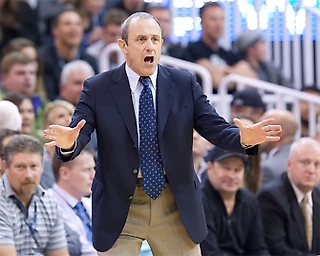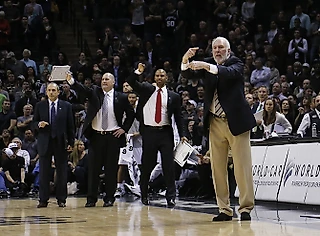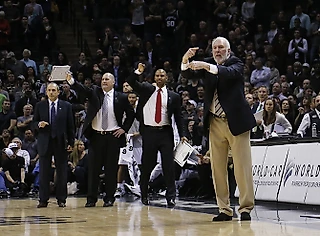Now they know about Theo
Messina Online
Last week Theo Papaloukas was voted Player of Year by FIBA Europe. This is the recognition of the great season he had with CSKA and National Team of Greece. He made a big step forward in his career over the last two years. Before that, he was famous as a player who changed the rhythm of the game coming from the bench. Since then he tremendously improved his ability to read the game and control its tempo. He mastered the ability to play both a slow pace and a high pace. This can be proved by the high number of assists he has made during this season.
We are proud and happy to have such a player in CSKA. I'm happy to coach him and I hope that he will have many more great seasons with CSKA.
This award is also a sign of how people perceive basketball in Europe. Theo finished first in the poll, leaving NBA stars - Nowitzki, Gasol, Parker - behind him. I think there were two main reasons for that. First, Theo has a reputation of an ultimate team player which is respected by coaches and journalists all over Europe more than for individual performance. With all due respect to other candidates, Theo is a living proof of team basketball. When we think about Nowitzki, we immediately recall points he scores from high post. We remember Parker for his lay-ups after pick-and-rolls and Gasol for his moves in the post. When we think about Theo, his brilliant assists come to mind first. He's like two times NBA MVP Steve Nash, who plays to let teammates score, to make everybody in the team happy. The second reason is that he has achieved significant success not only with CSKA, but also with the Greek National Team. This proves that the idea of a national team is still very important for many European basketball specialists.
The Americans perceive basketball in a different way. Let me give you personal opinion on this.
I believe European basketball is something in between US college basketball and NBA. In Europe, we have professionalism, money, audience and expectations that sometimes can be compared to NBA, but still, we play team basketball similar to college basketball.
The biggest adjustment American players have to make when they move to Europe is putting team goals ahead of their own goals. In NBA players are generally assessed by their individual performance with a lot of emphasis on individual statistics. If you managed to improve your stats by the end of the season, usually you receive a better contract regardless the result of your team. In Europe if your team wins, you're perceived as a better player. That means individual statistics are only important combined with the team result.
Another important adjustment is caused by the season structure. In Europe we have a small regular season with just 26 to 34 games in a national league and 20 games in Euroleague. With addition of playoffs in national championship, Cup and Euroleague we have about 70 games. As a result every single game, even away game against small team, is extremely important as it might affect your standings dramatically. No European club could afford starting the season the same way Dallas (4 straight losses) and Phoenix (4 losses in 5 games) did in NBA. The way the season is structured requires maximum concentration in almost every game and, consequently, in almost every practice. The mental toughness of the player is a big factor, if he wants to play in a top club in Europe. Most of American guys are not used to this pressure level. At least, not in NBA, where you can afford losing some of 82 games.
Rules in Europe, which allow a lot of help from the weak side, imply that only players understanding the whole concept of the game can be efficient. Understanding how 1 on 1 or 2 on 2 works is no longer enough. On the other side, rules make it possible for the team to make up for the lack of quickness of any given player.
Trajan Langdon is a very good example. In NBA he was considered an up-and-down shooter, while in college he had been an excellent shooter. In NBA defenders stay close to their opponents because they are much better athletes. So if you're not very quick at releasing the ball you'll find it hard shooting with high percentage. Trajan has a great shot, but he's not the quickest guy on the planet. Trajan's defense is really good in terms of fundamentals and understanding of the situation, but he doesn't have the quickness of, let's say, J.R. Holden. In the NBA it is possible to isolate Langdon against quicker opponent with a little possibility of help of teammates. Without help of teammates few players can stop the opponent by themselves. So in both cases - shooting and defense - he needs a system where there is also help from teammates.
One more point. Trajan was the captain in Duke University. He was grown up thinking that the team is more important than the individuals it's formed of. When he was drafted by Cleveland Cavaliers, he probably found himself in a situation where everybody was fighting for themselves. The situation where everyone was focused on individual goals bothered his mentality. He was not in the right water for him. That's why he chose to come to Europe, I suppose.
This doesn't mean you could easily find a good player in a college. Over last 6-7 years NBA is recruiting the majority of good players just after 1-2 seasons in college by promising big money. A talented player hardly ever graduates nowadays. They come out being good at jumping, running and just basic fundamentals. They don't have time to develop a good overall understanding of the game what you need 4 years in college for. Moreover, many players feel frustrated if they don't get to NBA. You need to be very lucky to find the one who comes out of the good school and isn't destroyed mentally by the fact that his abilities weren't called for by NBA.
If you have a player who goes to Europe as a back-up choice, it will be a disaster. He won't like it here, he will have difficult time, he will live here thinking about NBA. Only after 1 or 2 years when they really put the idea to go back to the NBA away from their mind, they make a big step forward. They accept their basketball life is here, they concentrate on it and it has a positive influence on their career.
The majority of American players don't even know what European basketball is. If you tell them "I'm going to play for CSKA in Euroleague", they will think that you're far away in some strange country with a very bad basketball. Therefore, for many of them being a twelfth man in an NBA franchise, sitting on the bench, waving a towel and getting a lot of money is a fantastic career, because they don't know the alternative.
We're lucky in CSKA, because we have Trajan, J.R. and David Vanterpool who also had an opportunity to play in NBA and after played many years in Europe. They liked European system and they are not thinking about getting back to NBA by all means. They prefer to be protagonists here, play Euroleague games in front of 5-10 thousand people.
As for European players in NBA, they have to adjust themselves greatly in terms of playing back-to-back games, travels, lots of contact, serious competition inside the team, because nobody wants to lose his place.
I spoke a lot to Manu Ginobili. He made a tremendous adjustment. He was lucky to finish in a good club with a very good coach, a very good system that focuses on people. I'm not sure whether another team would have patience to let him play his way. San Antonio had a vision of Manu as a great player that helped him to work patiently to find his place, because his first month was not that good.
Many European players need a system to support them. They have great fundamentals and a great understanding of the game, but they are not so strong physically and not so quick to play 1 on 1 all the time. Just a few of them can consistently play this way. For example, Manu and Tony Parker.
Rules in NBA are different from rules in college and high school basketball in the US. The reason is simple. NBA top management is interested in creating a lot of match-ups between stars and plenty of great plays. It's easier to have high number of spectacular plays when you play 1 on 1 or 2 on 2 and give a lot of space to the stars, than allowing help from the weak side and collapsing. They adjusted the rules accordingly. Unless you have 5 good players, you are forced to put the ball in the hands of your best player most of the time. This trend started with Bird and Magic match-ups. Ever since then NBA emphasizes the superstars and makes a lot of money on TV rights, tickets, merchandising and so on. It's a big business.
Even in Toronto, where they have Calderon, Garbajosa, Bargnani, the majority of possessions end up by Chris Bosh going one on one. It's not necessarily that European players' ability to share the ball will make the difference in NBA. NBA management has the greatest impact on the development of basketball in the US. As long as they have rules like that, they promote the kind of basketball, which is completely different to the European kind.
When they ask me about playing CSKA versus Clippers during the regular season, I answer that everything depends on the rules, not only the physical shape. One week difference in preparation isn't a big deal when you play just one game. For ten games it might make the difference. I must honestly admit that we played with majority of European rules during NBA Live Tour, especially defensive rules. This allowed us to play our normal helping defense.
Few teams - Miami, San Antonio, Detroit, Lakers, Dallas, Phoenix and Utah that always play team basketball – have possibility of winning the NBA title. Only teams with both great players and the idea of how to play together can compete at this level. The combination of three things - mentality of the management, tradition of the club and selecting a good coach who can influence the team mentality - makes the difference for these teams. All their coaches strongly believe in the idea of team basketball. All players in these franchises are required to follow some principles.
A few words on international competitions. US national team moved in the right direction, I believe. Mike Krzyzewski has USA Basketball GM Jerry Colangelo who was famous president and owner in Phoenix and who understands European basketball. Perhaps, they needed more time for preparation, as one summer was not enough. It's not that they don't respect their rivals. I think they do respect now, but don't always make the effort to understand their competitor in a more profound way.
First, I was very surprised when Coach K mentioned several times in his interviews that in Europe we play with 30 seconds time limit. Then I was surprised when he didn't come to Prague to see the Euroleague Final Four, while his season finished four weeks before that. If he had come, he would have understood a lot about the way European teams play, he would have understood a lot about European players and, especially, Theo Papaloukas who killed the US national team in the semi-finals of the world championship. I think now they will take more time to understand who they are going to face.




